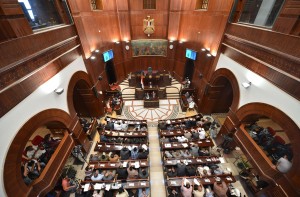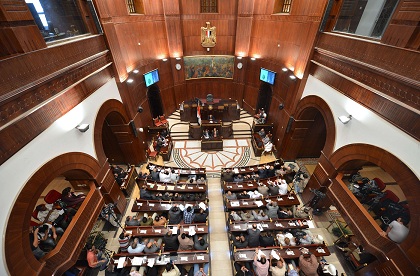
(AFP File Photo)
By Ibrahim Al-Masry and Basil El-Dabh
A European Union representative expressed concerns about the draft NGO law during the Shura Council’s Sunday session.
EU representative Stabros Lambrinidis met with the Shura Council’s committee on human development to discuss the bill, which he claimed contained concerning language.
Lambrinidis said that “according to international standards, there are some paragraphs that concern the Venice Commission,” referring to an independent advisory body to the Council of Europe that focuses on constitutional law.
The envoy also spoke about the issue of foreign funding as dictated in the draft law submitted by the presidency.
The Venice Commission, according to Lambrinidis, disapproved of the oversight proposed on foreign funding, while adding that illegal funding was a “legitimate concern”, but said requiring authorisation prior to working should be removed from the draft.
“There are some materials concerning foreign funding and international NGOs that the Venice Commission sees as incompatible with international law,” added Lambrinidis, saying the commission had determined a number of other ways to effectively monitor the work of civil society.
Lambrinidis said the EU would continue to discuss the international standards that it believed needed to be included in the final draft.
“Our goal is to shed light on the changes that can occur,” he said. “It is a path of great interest to the European Union.”
He highlighted that working with a democratically-elected government allowed room for further discussion for Egypt to consider recommendations from the Venice Commission when finalising the NGO law.
Abdel Azim Mahmoud, chairman of the committee on human development, said the draft law would continue to be discussed among members of the Shura Council and members of the country’s civil society organisations.
Civil society groups and international observers alike criticised the NGO draft law.
A subcommittee hearing in Washington DC on Thursday discussed the sentencing of 43 NGO workers and the draft law, which they said would lead to more restrictions on civil society.
The Carter Center also said it found the draft “troubling” and “onerous”, while EU delegation head James Moran last week said that he had noted improvements in the draft law, but were not at the expected level.
The high representative of the EU’s Union for Foreign Affairs Security Police and Vice President of the Commission Catherine Ashton said the draft “contains elements that can unnecessarily constrain the work of NGOs” and “has to be in line with international standards and obligations of Egypt.”


